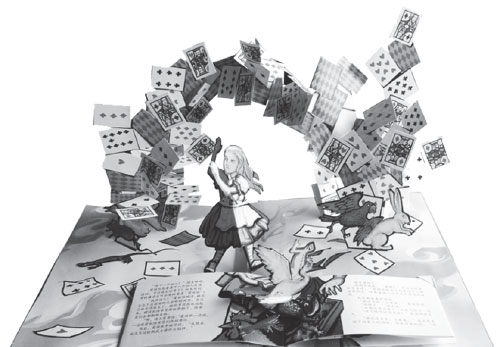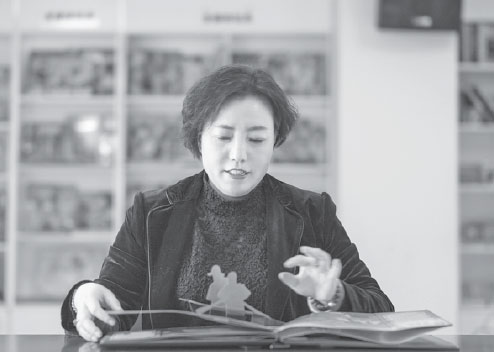Pop-up books in China
Updated: 2016-02-12 08:14
By Mei Jia(China Daily)
|
||||||||
From Ming to Alice, publisher creates works of art for domestic readers
A chance encounter with a captivating children's pop-up book in a Milan bookstore sent Wang Yihua on a magical journey of her own.
"I was so amazed, even as an adult. I just couldn't put the books down and sat there reading until the business hour was over," Wang said.
She began to wonder: "Why can't my daughter and other children at home have books like these?"
A creative mission followed, and in the decade after that enthralling discovery in Italy, she built Lelequ, China's leading pop-up book publisher, from scratch.
These days, Wang has been busy fulfilling her promise to publish a bilingual pop-up book about Ming, the much-loved giant panda who survived the Nazi blitzkrieg and cheered British hearts during the war some 70 years ago.
She attended the installation of a statue memorializing Ming, a gift from the Chinese people to the London Zoo, during President Xi Jinping's official visit to the United Kingdom in October.
The text of the story is already complete, and a paper-art designer and illustrator are working to enable Ming to pop, flap and swirl as readers turn the pages.
"We're confident that the Ming book will have huge appeal," Wang, chair of the Ronshin Group publishing house, told China Daily during a book fair in Beijing in January.
Wang's early years as a pop-up publisher were challenging. Pop-up books are priced significantly higher than regular books - sometimes 10 to 20 times higher - and require special skills.
The new company had no marketing channels, no experience, and factories able to print their products were contracted to foreign publishers.
"When we started, people said our prospects were dim, because pop-ups books, which require a handmade process, were way too costly for Chinese market," Wang said.
But where others saw obstacles, Wang saw opportunity, and says she found a "Blue Ocean" to explore.
"My experience told me that things were likely to change as China's economy developed," she says. "And Chinese parents are known for high involvement in their children's education."
Her persistence encouraged her colleagues, editors and designers, to research and create their first book on their own. The company was started in a warehouse in the eastern suburb of Xi'an city, Shaanxi province, in 2006. The main floor was turned into an office, and the second and third floors housed a small factory.
"We had no skilled workers to piece the parts together, so we learned along the way and taught the new workers we hired by hand," says Yan Hongbing, the group's art director.
The company's first product was the Playtime series for kindergarten children. "I remember the excitement on Wang's face, as she ran between the floors like a child upon the successful production of Playtime," Yan says.
In the years since, Lelequ grew to 300 employees and more than 2,000 titles. To nurture the market for pop-ups books, Wang tried new things. She even partnered with a powdered baby milk producer to provide pop-up books with formula.
In 2008, Wang expanded the company to produce other special-effect books, including some more like toys that included items such as colored pencils or origami paper.
Sun Zhaozhi, vice-general manager under Wang, said the company is always pushing for breakthroughs.
"Wang convinced me that quality is the key. Once we decide a book is a good book, we pursue it with all we have, regardless of its market prospect," Sun said.
After months of effort in 2007, piecing together 700 parts, the team presented the first Chinese version of Robert Sabuda's recreation of Alice's Adventures in Wonderland as a pop-up book. Last year, the book's second edition was released.
In one breath-taking scene, 104 mini playing cards erupt from the book's pages, "making the book not only a good read, but also a collectors' favorite", said Taitung University's Lin Wen-Pao, a children's literature professor.
"Parents gradually accept and learn to utilize the interactive nature of pop-up books in early education," Lin said.
In the meantime, Wang spent years trying to purchase the right to publish a pop-up version of Le Petit Prince (The Little Prince), but was refused over worries that there was no market for a book priced at 60 euros ($65).
Viewing the success of the Alice book, the French publisher finally authorized the endeavor, "touched by our courage and unremitting effort in presenting a deserving book to our readers", Wang said.
It was a hit after being released in September.
Wang, who was born in 1964, fostered her style. She started as an art editor and worked at an advertising company under a film producer in Xi'an from 1986 to 1997. She went to the Xi'an daily Chinese Business View in 1997 and helped improve the newspaper's performance, but felt insecure as print faced numerous challenges by Internet and new media.
"At the age of 42, I felt I would be stuck in a dead end if I didn't do something to elevate the whole business," she said. That year, she established Ronshin Group and tried to fill a gap in children's publications that she saw when she compared Chinese publishing to the industry in foreign markets.
Wang, who has sharp memory for numbers and likes to attend public lectures, also cooks and collects calligraphy.
Her next plan is to publish pop-up masterpieces that even adult readers would love, such as a new Harry Potter pop-up book, and a series of highly original paper art works by David A. Carter, a master paper engineer known for his Bugs series.
Wang also wants to publish more pop-up books that feature Chinese interests and history, as this is what she is making effort to achieve. "Kids need to read works that are based in their own culture and match their reading habits," she said.
meijia@chinadaily.com.cn
|
A scene from Lelequ's version of Alice's Adventures in Wonderland that showcases the sophistication of making pop-up books. Provided to China Daily |
|
Wang Yihua, the publisher who did much in promoting the popularity of pop-up books in China. Provided to China Daily |
(China Daily 02/12/2016 page5)
- ASEAN wants good US-China relations
- Jury finds NYPD's Liang guilty in fatal shooting
- Major powers agree on plan to break Syria deadlock
- Munich Security Conference opens amid concerns
- General strike against pension reform brings Greece to standstill
- Madrid airport sounds alarm after bomb threat on Saudi plane

 Spectacular Harbin snow sculptures draw holidaygoers
Spectacular Harbin snow sculptures draw holidaygoers
 First Capitol billing for Lunar New Year
First Capitol billing for Lunar New Year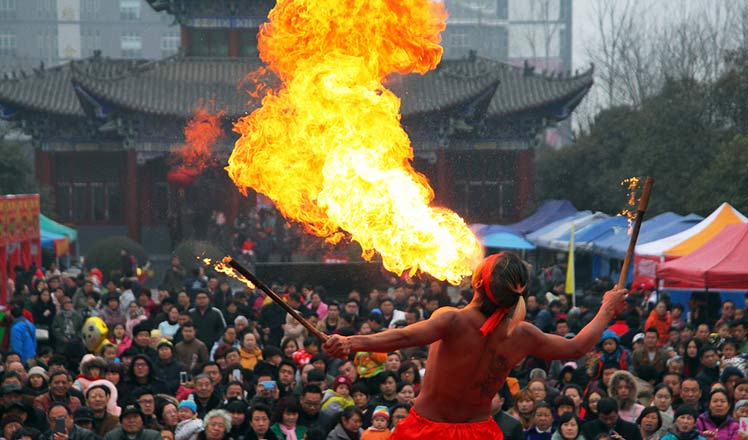
 All you need to know about China's Spring Festival temple fairs
All you need to know about China's Spring Festival temple fairs
 Special souvenirs
Special souvenirs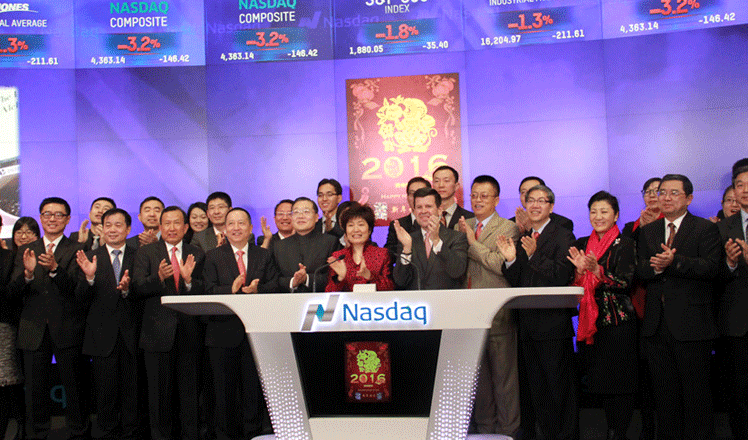
 Opening bell on Chinese New Year's Day
Opening bell on Chinese New Year's Day
 The world celebrates Spring Festival with China
The world celebrates Spring Festival with China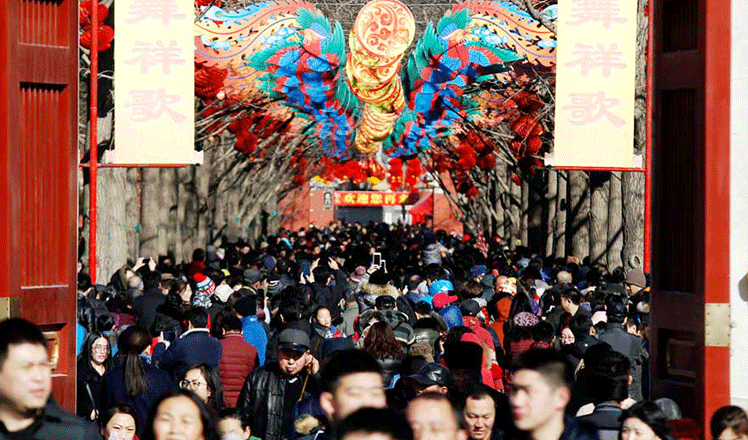
 Ditan Park temple fair embraces Chinese New Year
Ditan Park temple fair embraces Chinese New Year
 Xi Jinping grieves over Taiwan quake, vows aid
Xi Jinping grieves over Taiwan quake, vows aid
Most Viewed
Editor's Picks

|

|

|

|

|

|
Today's Top News
National Art Museum showing 400 puppets in new exhibition
Finest Chinese porcelains expected to fetch over $28 million
Monkey portraits by Chinese ink painting masters
Beijing's movie fans in for new experience
Obama to deliver final State of the Union speech
Shooting rampage at US social services agency leaves 14 dead
Chinese bargain hunters are changing the retail game
Chinese president arrives in Turkey for G20 summit
US Weekly

|

|
